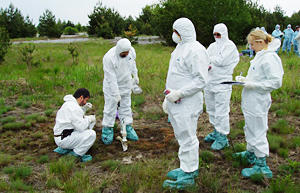BioterrorismU.S. unprepared for large-scale bio-attack, report warns
On Wednesday, the WMD Center released its latest report that found the United States is unprepared for a large-scale biological attack, despite spending more than $65 billion on biodefense over the past decade; the report warned that the threat of biological weapons is now greater than ever as a result of technological advances; a small team of individuals with training in key disciplines can produce “the type of bioweapons created by nation-states in the 1960s”

U.S. preparedness levels questioned // Source: un.org
On Wednesday, the WMD Center releasedits latest report that found the United States is unprepared for a large-scale biological attack, despite spending more than $65 billion on biodefense over the past decade.
The report warned that the threat of biological weapons is now greater than ever as a result of technological advances. Now, a small team of individuals with training in key disciplines using equipment readily available over the Internet can produce “the type of bioweapons created by nation-states in the 1960s.”
Security experts have been well aware of the catastrophic potential of a biological attack, yet despite this knowledge, the government has largely failed to prepare the nation for a large-scale attack.
“If you look at capabilities of terrorist groups, if you look at their intentions and you look at our vulnerabilities … the threat is very high,” saidformer Missouri Senator Jim Talent, the report’s co-authors.
“There are going to be things in [the report card] that really make the people of Washington sit up and take notice about the progress we have not made,” Talent added.
The “Bio-Response Report Card” concluded that the “nation does not yet have adequate bio-response capability to meet fundamental expectations ruing a large-scale biological event.”
The WMD Center gave government leaders a “C” in detecting and diagnosing small-scale biological attacks, and largely assigned “Ds” and “Fs” for attribution, medical countermeasures, and medical management for large-scale attacks.
According to the report, one of the root causes for the lack of preparedness is a failure of leaders in Washington to understand the critical threat that biological weapons pose.
“The good news is that everybody who is aware of this threat wants to prevent it. The problem is that there’s just not a high enough level of awareness,” Talent said.
“Too few leaders in government or the private sector fully understand the growing threat of bioterrorism—and its potential consequences,” the report warned.
“America needs leaders who will set clear priorities within the bio-response enterprise; assign authority; demand accountability; and inspire the confidence, commitment, and unity of effort necessary to strengthen bio-preparedness and response capabilities nationwide.”
In addition, Talent noted that money for biodefense has either been insufficient or spent ineffectively. As an example, he pointed to the limited spending on developing methods to clean up biological pollution following an attack that could leave vast portions of an urban uninhabitable.
“We spend less on remediation than we do on the Marine Corps band,” he said.
To help policymakers improve biological preparedness, the report urged leaders to “concentrate their efforts and resources on strengthening response capabilities required for large-scale contagious and large-scale non-contagious event.”
In particular lawmakers should focus on “leadership that inspires confidence, commitment, and unity of effort,” “mobilizing a ‘whole of nation’ bio-response capability,” and “sustained investment in purpose-driven science.”
Talent and Bob Graham, a former senator from Florida and the report’s co-author, hope the report card leads to improvements in the White House and Congress.
“We’re not leaving anybody with any excuse for inaction and response to this [report card],” Talent said. “It’s intended to be constructive. It’s also intended to be honest, and I think it is.”
